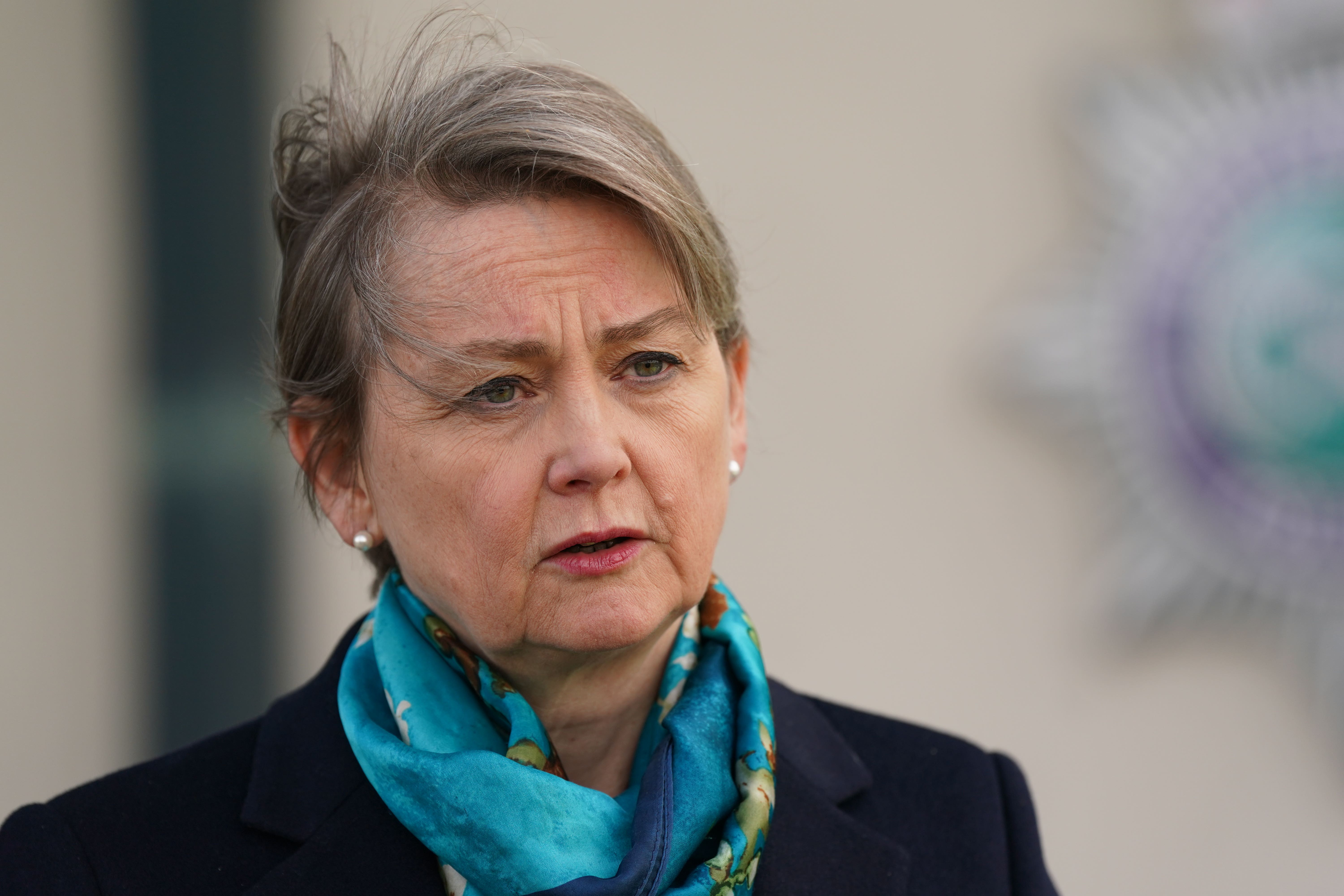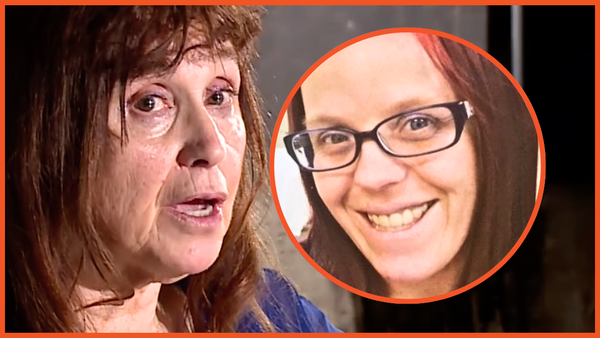There is growing confusion over whether the UK’s migrant returns deal with France leaves open a loophole which would allow for human rights claims to hold up deportations.
The “one-in, one out” deal coming into effect on Wednesday will see migrants ineligible to stay in the UK sent back across the Channel, in exchange for taking those who have links to Britain.
But the terms of the treaty indicated that migrants who had arrived in the UK via small boat could frustrate attempts to deport them to France, as the agreement contains a clause that says in order for people to be returned to France the UK must confirm they do not have an “outstanding human rights claim”.
Critics have argued this could risk bogus applications being made to frustrate the deportation process and cause delays.
But speaking to Sky News on Wednesday morning, cabinet minister Lisa Nandy claimed this was not the case, instead saying human rights cases would be heard in France.
"The deal that we've struck will allow people with us to send people back to France who have human rights claims”, the culture secretary said.
“Those claims will be heard in France. So I know that the Conservative Party has been saying that this is a loophole. It isn't, and we're really confident about that."
However, Home Office sources said that migrants with an ongoing human rights claim would not be removed from the UK until their claim is complete in UK courts.
If, however, a claim hasn’t been commenced then an individual can be removed, with any further legal challenges being dealt with in the French courts.
It is also understood that people with claims that have been ruled as unfounded can be removed even where there is a possibility of future legal challenge.
The row came after shadow home secretary Chris Philp said the treaty offered “an easy loophole for lawyers”, adding that “France will not give us any data on the people they are sending our way… so we have no idea who they really are”.
On Tuesday, borders minister Dame Angela Eagle hit back at his remarks, claiming that the clause was included “precisely to ensure no-one can use ‘clearly unfounded’ human rights claims to avoid being returned”.
She added: “And we will do full security checks on any applicants, and reject anyone who poses a risk.”
Migrants who arrive to the UK on a small boat will likely have their asylum claim found inadmissible due to the fact they came from France, which is a safe country.
If they are able to get access to legal representation, they might be able to challenge that decision based on their own personal circumstances, such as if they have a history of being trafficked.
Elizabeth Cole, solicitor at Duncan Lewis, said: “An inadmissibility decision might be inappropriate in many cases, depending on the circumstances of an individual's journey to the UK, treatment in France and other compelling reasons they have to remain in the UK.
“A decision which fails to properly account for these issues, including due to inadequate access to legal advice, may be unlawful. The same would apply to any subsequent attempts to remove to France.”
She added that the law firm also had concerns about how people would be selected for relocation to the UK from France, with many unable to provide ID documents.
Steve Smith, CEO of Care4Calais, who were part of the legal challenge against the government’s Rwanda plan, also said that the charity would “explore all legal options, small and large, individual and systemic, to challenge any policy that denies people the right to seek sanctuary in this country”.
The treaty also appears to give France and other EU member states an effective veto over which individuals are returned, as well as stating that the UK will pay all costs of transporting asylum seekers to and from France.
“If France considers that an individual would be a threat to public policy, internal security, public health or the international relations of any of the Schengen States...France shall refuse the readmission request”, the document says.
When the agreement was announced by Sir Keir Starmer in joint press conference with French president Emmanuel Macron, the prime minister said it was a “breakthrough moment” which would “turn the tables” on the people smugglers who bring them here.
This week home secretary Yvette Cooper conceded that the accord is not a “silver bullet” to stop small boat crossings, but said it marked a step change as migrants will be sent back across the Channel for the first time.
Speaking to the BBC, she declined to put a number on how many people would be returned under the agreement ahead of time, saying that she believed it could aid criminal gangs.
She added: “We will provide regular updates, people will be able to see how many people are being detained, how many people are being returned, and it is right that we should be transparent around that.”
Speaking to reporters on Monday, Tory leader Kemi Badenoch said the deal would likely result in only small numbers of migrants being swapped with France and is “not going to make any difference whatsoever”.

Asked whether the Conservatives were partly to blame for the immigration and asylum situation, she told reporters: “No I don’t accept that at all, because what Labour are doing is just rubber-stamping all of the applications and saying they’re processing.”
Bruno Retailleau, France’s interior minister, said the agreement “establishes an experimental mechanism whose goal is clear: to smash the gangs”.
The treaty was ratified on Monday, meaning that anyone entering the UK on a small boat can be detained immediately on arrival and returned to France by the UK government – with the Home Office expecting detentions to begin within days.
The EU Commission, Germany and other member states have also given the green light to the agreement - quashing previous concerns that the bloc could oppose the deal.
Immigration Enforcement have set aside space at immigration removal centres, the government said, while Border Force have an operational strategy ready to identify and process groups of inadmissible migrants for removal.
The Home Office also said it had learnt lessons from the lengthy legal challenges which hampered the Tories’ failed Rwanda scheme, saying it is “prepared to robustly defend any legal challenges to removal within the initial trial phase”.
Labour has put a pledge to crack down on the number of people coming to the UK on small boats at the centre of its plan for government.
But with boat crossings at a record high, and the asylum backlog still above 75,000, there is mounting pressure on ministers to take more drastic action - pressure which is exacerbated by the success of Reform UK in the polls.
Last week figures showed that the number of migrants arriving in the UK after crossing the English Channel topped 25,000 – the earliest point in a calendar year at which the 25,000 mark has been passed since data on Channel crossings was first reported in 2018.
It comes amid escalating protests across the UK opposing the use of hotels to house asylum seekers, with a number of people arrested after a protest outside a hotel in Canary Wharf in London on Sunday.
The Home Office declined to comment.
Indiana announces a ‘Speedway Slammer’ to house migrants like ‘Alligator Alcatraz’
Protests against Palestine Action ban to continue ‘until November’
First Channel crossing migrants arrive in UK as returns deal comes into force
Russia asks Central African Republic to replace Wagner with state-run Africa Corps and pay for it
Starmer opens door to income tax rise in autumn as pressure to fill £50bn hole mounts
Reeves warned she must raise taxes or cut spending to plug £50bn black hole







